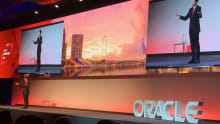HR leaders need to drop the idea that post return to normal, life will be less frenetic

Let’s Talk Talent Read similar articles

The only thing constant in life is change. But in today’s world, the rate of change has become even more unprecedented. In order to keep pace with its speed, organizations today need to be more prepared, more agile. If organizations are not disrupting anything, then they stand the risk of being disrupted. They require their employees also to be more prepared for a disruptive future. And HR has a bigger role to play than ever before.
How exactly can HR play this expanded role? What exactly will be its new role in the era of disruptions? In an exclusive interaction with People Matters, Alison Sibree, Senior Vice President Human Resources, Asia Pacific & Japan, Oracle, who was a speaker at Oracle OpenWorld Asia in Singapore, sheds light on how HR leaders can prepare their organizations for the disruptive future.
What are the key things HR leaders need to focus on to prepare their organizations for the age of disruptions?
Future required skills are complex problem solving, creativity, emotional intelligence, cognitive flexibility, and collaboration. HR needs to help their organization identify the leaders who have these skills. Having the right leaders in place, with the right skills, will help organizations swiftly pivot and transform. Remember that transformation happens very rapidly. HR needs to help employees adopt new innovation, ensure that the organization has exciting technology to attract and retain talent, ensure career movements within the organization to keep employees excited about their role – probably role changes every two to three years.
“Benefits & performance management/feedback processes need to reflect the needs of four generations of employees which many organizations now have within their workforce.”
What are some of the challenges organizations will face in this preparation?
Technology is a key factor. Most people can afford to buy the best and most powerful gadgets for their personal use. They expect this, too, in the workplace, if not we will not be able to attract the best and brightest talent. We need managers and leaders who understand that the younger members of the workforce need constant and immediate feedback, given their conditioning by social media. Learning/development needs to be targeted and podcast in style-bite size, quick learning opportunities are the order of the day.
What will be HR’s new role in this era of disruptions?
Adopting state of the art learning modules, geared to employees’ current and future roles, HR needs to ensure that a performance management system reflects the needs of their employees, which is frequent updates of goals and constant feedback. Knowing what internal opportunities exist is a must. Clearly, things like compensation need to be market competitive and rewards flexible to meet the needs of the various generations.
What is the one thing HR leaders need to stop doing to prepare their organizations for disruption?
“HR leaders need to drop the idea that “when we return to normal, life will be less frenetic!”
HR must be flexible, agile and fast-paced to keep abreast of the rapid pace of the external world. We must be organized to win! Understanding what keeps our leaders awake is always a must. So, unless HR understands the external pressures, we cannot be effective partners to our organization’s leaders.
How do you think these disruptions shape the employee experience of the future employee?
Modern employees are very adaptable. Especially, the millennials are accustomed to disruption, rapidly changing technology and they expect to change jobs/roles very frequently. They expect that appropriate learning opportunities will be in place to accommodate this aspiration. If we do not do so, we cannot hope to retain them in the organization.
How do HR leaders shape the learning experience in order to prepare employees for a disruptive future?
HR needs to ensure that learning is bite size in duration, fits into their busy schedules, and is easy to access – anywhere, anytime and via mobile devices. Importantly, it should be very targeted. Soon this will be available via machine learning, which will create recommended systems for personalized learning paths!
(This article is based on an interaction with Alison Sibree, Senior Vice President Human Resources, JAPAC, Oracle in the background of Oracle OpenWorld Asia in Singapore. Click here to know more about the evolving role of HCM and the innovations in HR, powered by Oracle.)







